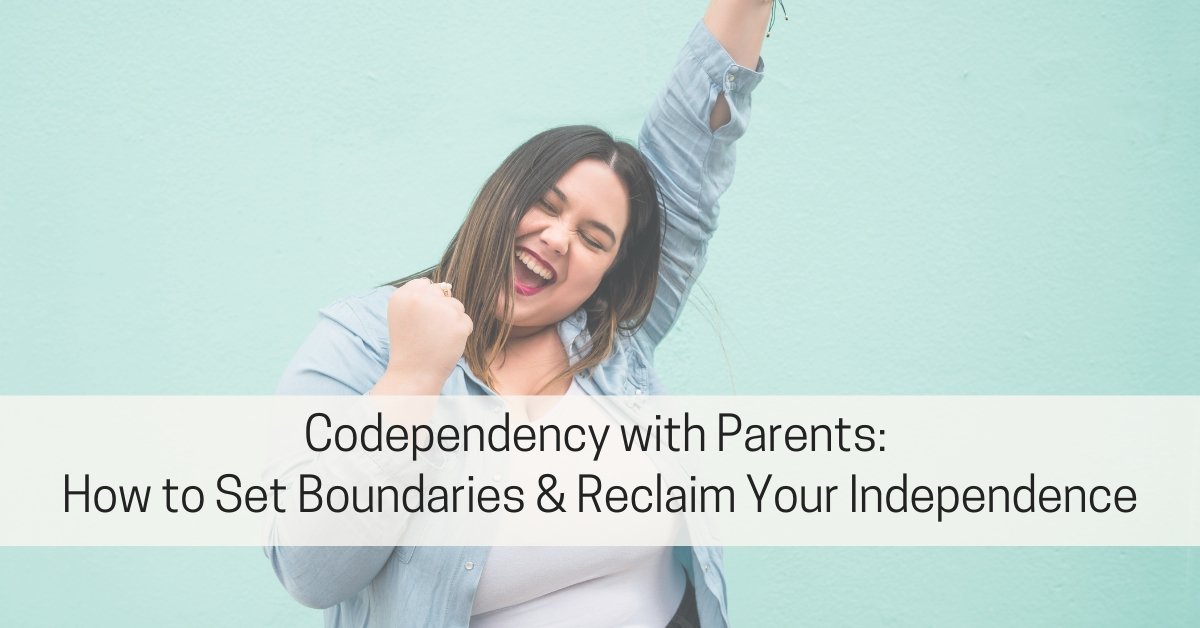Do you drop everything when your parent calls, even if it means canceling your own plans? Do you frequently feel guilty if you try to set limits or put your own needs first? Or maybe you feel like your life isn’t fully your own because their needs and expectations always come first. If you grew up in a dysfunctional family, you might wonder whether your relationship with your parents is healthy or if you’re experiencing parent-child codependency. Recognizing the signs of codependency with parents is an important first step toward creating a healthier relationship with your parents.
Signs of Codependency with Parents
One of the clearest indicators of parent-child codependency is when you consistently feel responsible for your parent’s happiness or well-being. This goes beyond normal care and concern—it’s a deep-seated belief that their emotional state is somehow your job to manage.
Here are the most telling signs of a codependent relationship with a parent:
• Difficulty saying “no” – You agree to requests even when they conflict with your own plans and needs.
• Seeking constant approval – You feel compelled to get their approval before making decisions that should be yours alone.
• Guilt when prioritizing yourself – Taking time for your own needs feels selfish, and you’re consumed by guilt when you do.
• Feeling emotionally drained – Interactions leave you exhausted rather than energized.
• Self-worth tied to their validation – Your worth depends heavily on their approval and praise.
• Walking on eggshells – You constantly monitor their mood and adjust your behavior to avoid upsetting them.
• Taking on inappropriate responsibilities – You feel responsible for managing their financial problems, emotions, or life decisions.
If several of these signs sound familiar, you’re likely dealing with codependency with parents.
Healthy vs. Unhealthy Parent-Child Relationships
Understanding the difference between normal family closeness and emotional enmeshment can be challenging, especially if you’ve grown up in an enmeshed system.
Healthy Family Closeness: Mutual respect for boundaries, emotional support without conditions, freedom to be yourself, independence is encouraged and expected, disagreements are addressed through open and honest communication, and individual identities are respected and maintained.
Unhealthy Emotional Enmeshment: Independence is seen as betrayal, family needs are consistently prioritized over individual needs, guilt is used as a form of control, boundaries are met with resistance, your identity is intertwined with the family identity, and loyalty is demanded through emotional pressure.
The key difference lies in autonomy; healthy relationships respect your individuality, while enmeshed relationships make stepping away feel like a betrayal.
Why Codependency with Parents Happens
Some parents struggle to let go because they see their adult children as extensions of themselves rather than as separate individuals. When you become more independent, it can feel like a personal loss to them. These parents may have tied their own sense of success and identity to your choices and achievements, feeling threatened by your independence because it challenges their purpose or values.
In many cases, they may also be repeating patterns from their own upbringing, unaware of healthier ways to relate to adult children. Fear of abandonment, loneliness, or loss of control can fuel their need to stay overly involved, keeping the cycle of codependency in place.
How Codependency with Parents Impacts Other Relationships
The effects of codependency with a parent ripple through all your adult relationships—romantic partnerships, friendships, and even your relationship with your own children.
In romantic relationships: Your partner might feel like they’re always competing for your attention, coming in second place to your parent’s demands. Consider Taylor’s story: Every time she and her boyfriend made weekend plans, her mother would call with an “emergency”—feeling lonely or needing help with errands. Taylor would immediately cancel their plans, telling her boyfriend, “Family comes first.” Enmeshment with your parent can erode trust and intimacy between you and your partner, making it tough to build a strong, lasting relationship.
In friendships: Friendships can also suffer if you repeatedly cancel plans or show up distracted or drained. Friends may feel like they can’t rely on you or that they’re walking on eggshells around topics involving your family. Some friendships may fade as people grow tired of the unpredictability.
With your own children: Perhaps most concerning, you may unintentionally repeat the cycle of parent-child codependency with your children. You might struggle to let your children develop independence, unconsciously recreating the same enmeshed dynamics you experienced. Alternatively, you might swing too far in the opposite direction, becoming emotionally distant to avoid repeating generational codependency.
How to Set Boundaries with Parents
Setting boundaries with a codependent parent can feel overwhelming, but it’s essential for your mental health and personal growth.
Tips for setting boundaries in a codependent relationship:
• Get clear on your limits – Write down what you’re comfortable with and what crosses the line.
• Use calm, direct communication – Practice “I” statements like “I need some space to process this.”
• Expect pushback – Resistance is normal. Stay consistent even when boundaries are challenged.
• Limit information sharing – Don’t share details that tend to be used against you or turned into guilt trips.
• Start small and build up – Begin with minor boundaries before tackling major issues.
A supportive partner or therapist can help you identify where boundaries need to be set and even role-play difficult conversations. However, it’s important that they don’t become another person trying to control your relationship with your parent. The goal is for you to develop your own sense of autonomy and healthier patterns across all relationships.
Additionally, setting boundaries isn’t intended to punish your parent. Boundaries are a form of self-protection; they safeguard your well-being and create space for a healthier relationship to develop.
Steps to Break from Codependency with Parents
Breaking free from codependency with parents is challenging but absolutely possible. It requires patience with yourself, commitment to growth, and often professional support. Remember that healing isn’t linear—there will be setbacks and moments of doubt, and that’s completely normal. You deserve relationships based on mutual respect rather than obligation, where your worth isn’t tied to how well you meet someone else’s needs.
Ready to take the next step? Consider purchasing a copy of our comprehensive e-book, “Navigating the Codependency Maze,” which offers detailed strategies, exercises, and insights to help you break free from codependent patterns. You’ll find practical tools for setting boundaries, understanding your triggers, and building healthier relationships with both family and romantic partners.
©2025 Dr. Sharon Martin, LCSW. All rights reserved. Photos courtesy of Canva.com.

The Better Boundaries Workbook
Your step-by-step guide to setting boundaries in all areas of your life.
“The most comprehensive resource available to help people struggling with setting healthy boundaries, people pleasing, and assertive communication.” —Dr. Marni Feuerman









